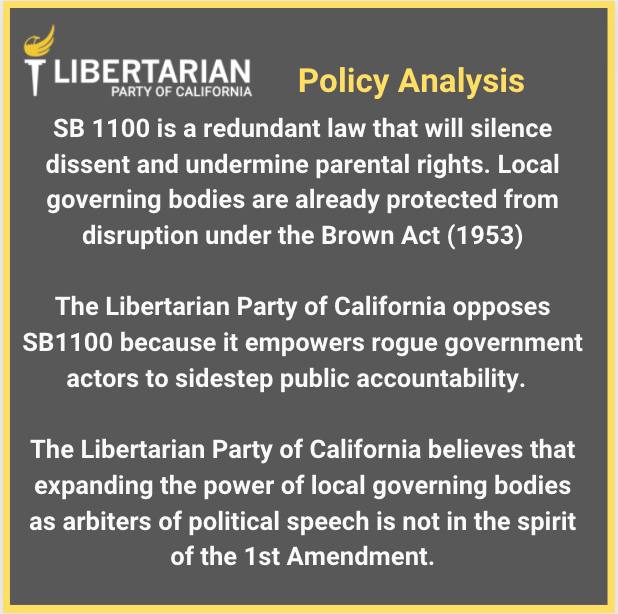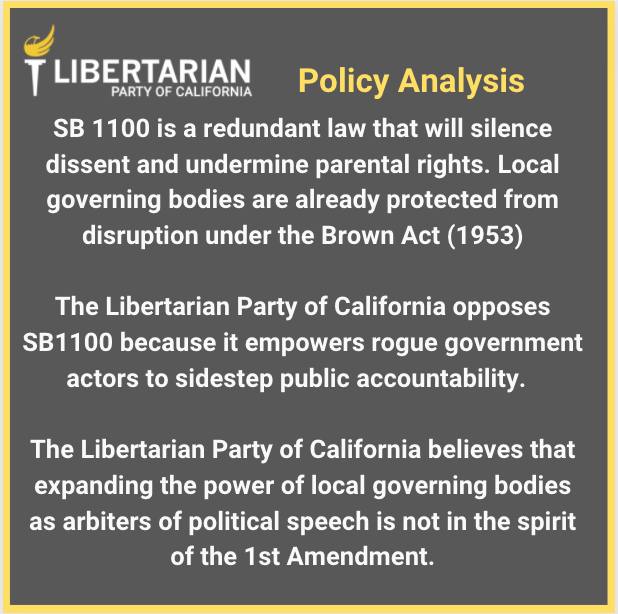From the Libertarian Party of California Legislative Committee:

Over the last two years, meetings for local governing bodies, like school boards, have become a battleground between elected officials and parents. A growing number of parents have felt that inappropriate subjects were being foisted upon their children; and discussions have sometimes boiled over, and elected officials claimed to feel threatened. In response to this, organizations such as the California Teacher’s Association have been pushing SB1100.
The Libertarian Party of California opposes SB1100 because school boards and other local governing bodies are already protected by the 1953 Brown Act and SB1100 could be used as a political weapon to silence dissent.
The Libertarian Party of California believes that an expansion of the powers of local governing bodies to be potential arbiters of political speech is not in the spirit of the 1st Amendment. The Ralph M. Brown Act is a wide-reaching piece of legislation that governs how local government business is to be conducted and how the public is allowed to interface with local government meetings.
Per the Brown Act, “a legislative body may exclude all persons who willfully cause a disruption of a meeting so that it cannot be conducted in an orderly fashion” (Brown 28). A primary objective of SB1100 is to “authorize the presiding member of the legislative body conducting a meeting to remove an individual for disrupting the meeting” (Cortese 1). However, we can clearly see that school boards and other governing bodies are already allowed to do this under the Brown Act.
The purpose of SB1100 is ostensibly to protect trustees, supervisors, and council members, but in reality would function as a political weapon to silence dissenters. The Brown Act allows anyone “disrupting” a meeting to be removed, and SB1100 would redefine “disrupting” as “engaging in behavior during a meeting of a legislative body that actually disrupts, disturbs, impedes, or renders infeasible the orderly conduct of the meeting and includes, but is not limited to, both one of the following: (A) A failure to comply with reasonable and lawful regulations adopted by a legislative body pursuant to Section 54954.3 or 54957.9 or any other law. (B) Engaging in behavior that includes constitutes use of force or a true threats threat of force” (Cortese 1). Both items A and B are reasonable, however the problem is that a “disruption” is “not limited to” only those two items (Cortese 1).
The presiding board member may exercise their discretion as to what reasonably constitutes a “disruption.” That power would naturally lend itself to silencing dissent given that many people falsely equate disagreeable speech with physical violence.
SB1100 has passed committee and goes to the Assembly floor next, so the time to act is now. Assembly members should be made aware that Californians stand against the silencing of political speech, and oppose SB1100.
References Cortese, Dave and Evan Low, SB-1100 Open Meetings: Orderly Conduct. https://leginfo.legislature.ca.gov/faces/billNavClient.xhtml?bill_id=202120220SB1100.
Brown, Ralph M. The Brown Act. https://oag.ca.gov/system/files/media/the-brown-act.pdf.


